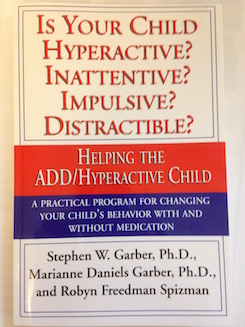Help distractible, impulsive, or hyperactive kids

By Kathy Kuhl
Book review of Is Your Child Hyperactive? Inattentive? Impulsive? Distractible? by Stephen W. Garber, Ph.D., Marianne Daniels Garber, Ph. D., and Robyn Freedman Spizman. Villlard, 221 pages.

Five-year-old Evan can’t stand still. Eight-year-old Jessie is a sweet daydreamer who never finishes her work and Calvin is such a terribly impulsive teen that his parents worry what he might do on a whim. Do you live with a child like one of these?
That how a team of three writers began their very helpful book, one which I’ve been recommending for years.
The book, Is Your Child Hyperactive? Inattentive? Impulsive? Distractible?, by Drs. Stephen and Marianne Garber and Robyn Spizman, offers good explanations and “a practical program for changing your child’s behavior.” Whether you want a diagnosis for your child or not, this book will help you help your child struggling with inattention, impulsiveness, distractibility, or hyperactivity.
Why read Is Your Child Hyperactive? Inattentive? Impulsive? Distractible?
The first ninety pages give you the understanding and framework to help your child, including:
- how to tell if your child has AD/HD
- how to motivate your child (because it’s hard to stay motivated when it’s hard to concentrate or plan ahead),
- how to explain AD/HD to your child
- how to gain acceptance and support from siblings and others (including friends and grandparents)
The bulk of book, about 125 pages, explains how to carry out training programs at home to help your children:
- control their own activity levels (including helping wiggly kids learn to sit)
- calm themselves. Some children have enormous trouble settling themselves down. They need to learn and especially to be made to practice techniques like relaxing their muscles and breathing slowly. This chapter tells how.
- Learn to resist distractions
- Gauge and improve their focus
- Control their impulses
- Follow rules
- Control aggression
I was glad the authors included a chapter on building self-esteem. Kids who have trouble paying attention get corrected so often (“Can’t you sit down?” “Pay attention!”), that it is easy for them to get too discouraged and want to quit trying.
The book’s methods work well with homeschooling. I used several successfully while we homeschooled, and I used one with my son’s teacher before we began homeschooling.
In hindsight, I wish I’d used these techniques more. With our extreme needs, I should have hired an AD/HD coach, or at least enlisted a trusted friend to read the book and touch base with me regularly.
When distractibility runs in families, it’s important that we parents get help giving help to our children. I’d have had more success if I had someone to help me keep looking at the big picture and to encourage me to keep going, since we were battling extreme distractibility.
The book also has a good chapter on if, when, and how to use medication to help with attention problems. I know my readers have many different opinions on medication for AD/HD, but whatever your view, you’ll find this informative.
How I wish the book was different
- I’d like more on how to help other adults who work with your child. The authors claim that teachers are trained in dealing with kids with ADHD. But some are not well-trained in this, nor are many co-op teachers, coaches, and the like.
- The title confuses some people. They may skim the very long title and focus on the first adjective, Hyperactive. This book will help families struggling with any of attention issues.
- The chapter on how to know whether a child has AD/HD is good. It describes some other causes of poor attention, but I wish it gave more. For example, auditory processing disorder is not mentioned. The authors mention diet only to say, “To date, no conclusive scientific evidence in any large sample of children has been found to support the theory that food reactions cause ADHD symptoms.” (p. 23)
There is now more evidence that some children are affected by diet. It’s complicated and individual. Diet certainly don’t help everyone. For one example of a food sensitivity causing attention problems, see my review of Fed Up.
Is Your Child was published 1995, so why do I still recommend it? It’s still 95% helpful, but in two small ways it seemed dated:
- It does not refer to the latest standards for diagnosing AD/HD, the DSM-5 published in 2015. (Minor issue.)
- While the medication chapter is very good, it misses the particulars of newer effective medications.
This book and Melinda Boring’s book Heads Up Helping are my favorite books on helping kids with attention problems. Melinda’s book deals more with controlling external factors. But Is Your Child focuses more on remediation, that is, on strengthening areas of weakness. The books make a great pair.
Is Your Child Hyperactive? Inattentive? Impulsive? Distractible? is well-organized and very practical. I recommend it.

